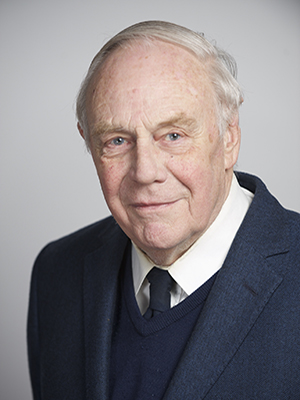Fellows
Professor Ronald Hyam (1936-2025)
It is with great sadness that the College announces the death of Professor Ronald Hyam, Emeritus Fellow, Emeritus Archivist, and former President of Magdalene College.

Professor Hyam devoted more than six decades to Magdalene, beginning his association with the College in 1960 as a member of the academic staff. He became an Official Fellow in History in 1962, serving until 2000, and an Emeritus Fellow thereafter. During that time, he contributed to almost every aspect of College life. He served as College Librarian from 1963 to 1993, Admissions Tutor from 1980 to 1982, Acting President in 1992–93, Deputy President in 1994, and President from 1996 to 1998. From 2000 to 2018, he was College Archivist, preserving an invaluable record of Magdalene’s history. His exceptional contribution was recognised through his appointment as Archivist Emeritus, reflecting his long and dedicated service. In later years, he remained a vital presence in academic life. Together with Professor Eamon Duffy, he co-edited The Benson Diaries, published in June 2025, offering a vivid insight into the life and times of a former Master of Magdalene.
Reflecting on his extraordinary service, the Master, Sir Christopher Greenwood, said: “A Fellow of the College for sixty-three years, Ronald Hyam seemed to be inseparable from Magdalene. A great historian and teacher of his subject, he took on one role after another but is particularly remembered as the Librarian who did so much to build up the splendid collection which the College now possesses and as the Archivist who knew every corner of the College’s records and ensured that they would be accessible to future generations. He loved the College, and that love was reciprocated. We shall all miss him very much indeed.”
Ronald Hyam’s first book, Elgin and Churchill at the Colonial Office, 1905-1908: the Watershed of the Empire-Commonwealth (1968) outlined a pivotal moment in Anglo-South African relations and a central preoccupation of his career as an historian, culminating in The Lion and the Springbok: Britain and South Africa since the Boer War (2003), co-written with his former student, Peter Henshaw. Professor Hyam viewed Apartheid as a moral abomination, and his teaching within the Faculty of History kept the longer course of South African history visible in Cambridge during this period. His engaging, oftentimes idiosyncratic lectures for the long-running History paper on ‘The Expansion of Europe’ were inspiring. They supplied the essence of Hyam’s Britain's Imperial Century, 1815-1914: a Study of Empire and Expansion (1976). This book swiftly became a classic: pithy, erudite and kaleidoscopic in its vision. A heavily revised second edition (1993) was the first general academic history of the British Empire to integrate subjects such as science, sports, and sexuality.
It was this last theme that inspired Professor Hyam’s Empire and Sexuality: the British Experience (1990). Meticulously researched, like all Hyam’s work, it was controversial in its emphasis on ‘sexual opportunity’ as a sustaining factor of imperial expansion, but it acquired for him a wider readership. The notoriety this book brought him perhaps distracted attention from what was to be the more important and most prolific period of Hyam’s output that gathered momentum after his retirement from the History Faculty in 2000.
Professor Hyam was a pivotal contributor to the British Documents on the End of Empire Project, which made the resources of the British National Archives more accessible to scholars than ever before. His editorial work between 1992 and 2000 (six volumes of documents, amounting to some 3,600 pages) was a major feat of scholarship. But the extended introductions to the volumes on the Labour Government of 1945-51 – of which Hyam was a particular admirer – and the Conservative Government of 1957-64 (co-written with Wm Roger Lewis) were foundational works of analysis. They underlaid what was perhaps Hyam’s most significant book, Britain's Declining Empire: the Road to Decolonisation, 1918-1968 (2006). This remains the best single-author account of ‘the winds of change’ and the high-political reckoning that culminated in Britain’s accelerated decolonisation. Empire had its many evils, Hyam argued, but far-sighted statesmanship brought, in its end, a measure of redemption. To this messy, contested process, Professor Hyam brought remarkable clarity, humanity and insight: he was a consummate historian.
Ronald Hyam will be remembered with deep affection for his formidable intellect, keen sense of humour, and warmth of spirit. His influence on generations of students, colleagues, and Fellows leaves an enduring legacy.
Funeral of Professor Ronald Hyam
The College community will gather for the funeral of Professor Ronald Hyam in the College Chapel on Friday 21 November at 11 am.
To help with planning, please let us know if you intend to attend by completing the RSVP form at the link below, or by emailing the Dean of Chapel at sct39@cam.ac.uk. You are also welcome to attend without replying.
As the Chapel has limited seating, attendees may be seated in Benson Hall where the Service will be streamed live.